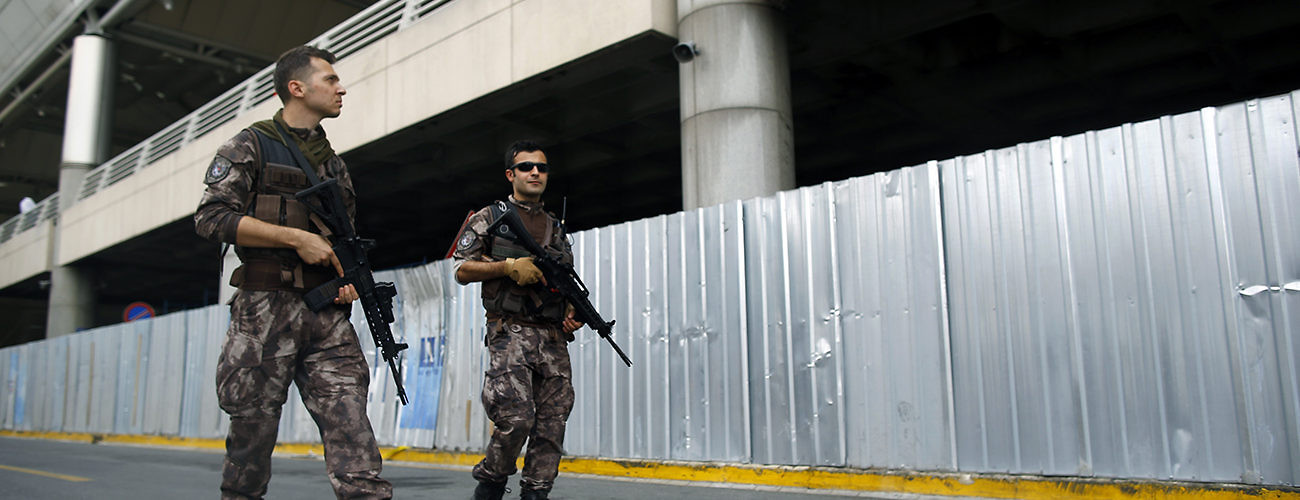Security forces patrol Ataturk Airport as a memorial ceremony is held for victims of last week's attack. Istanbul, Turkey, June 30, 2016.(Emrah Gurel/AP Photo)
The terrorist attack that killed more than 40 people at Istanbul’s Ataturk Airport last week has raised more questions about Turkey’s ability to identify and eliminate, or even contain, its growing terrorist threat. Regular violence continues to undermine public confidence in security forces and bleed the economy of much-needed income from tourism and other industries. The reality is that Turkey faces a near impossible task due to overlapping challenges depleting its resources.
The June 28 incident has also underlined the persistent risk from the Islamic State (ISIS), which is commonly thought to be behind the airport attack and has also been blamed for several mass casualty attacks in Turkey since 2015. In recent months there has been a surge in violence in the volatile southeast of the country and bombings in urban centers including Ankara, Istanbul, Midyat, Diyarbakir, Suruc, Gaziantep, Ovacik, and Bursa.
While most attention has focused on ISIS, the violence has displayed a multi-faceted character. Internationally, less attention has been paid to the role of leftist militants and Kurdish separatists, though attacks by groups such as the Kurdistan Workers Party (PKK), Kurdistan Freedom Falcons (TAK), and Revolutionary People’s Liberation Party/Front have continued apace. While Kurdish militant-related violence has been particularly severe in the southeast, PKK and TAK-claimed or linked attacks have also occurred in Ankara and Istanbul.
There are four broad challenges that preclude a more successful Turkish security effort against the current wave of violence. First, the country is located within a highly volatile region and its proximity to Syria and Iraq will continue to result in spill-over of the crises there. The financial cost of providing border security and of managing large refugee flows into the country is heavy, which detracts from the ability to meet domestic security concerns.
Second, Turkey’s territorial integrity is challenged by a very strong Kurdish separatist campaign in its southeast. Fighting there has raged for many years and the separatists continue to benefit from the support of the local community and allied armed and political groups in northern Iraq, northern Iran, and northern Syria. There are no signs of a detente between these parties, and a ceasefire that broke down in mid-2015 is unlikely to be reestablished any time soon.
Third, Turkey’s geopolitical position is fragile. As a predominantly Sunni state, it is bordered to the east by the powerful and predominantly Shiite Iran. To its south, the Iran-backed Alawite regime of Bashar al-Assad is regaining the ascendancy in its civil war with the help of Russia. Both Iran and Assad’s Syria are interested in reducing Turkey’s power and influence, particularly as Turkey is allied with Iran’s primary regional opponents, the Sunni Gulf states, and is a member of the United States-led NATO military coalition.
Finally, Russia remains an ever-present threat. It maintains a military presence in nearby Armenia, in the Black Sea and, more recently, in Syria. Despite some conciliatory gestures by Turkish President Recep Tayyip Erdogan to Russia’s Vladimir Putin, the relationship remains frosty and will likely take several months, if not years, to fully repair.
In the short term Turkey is likely to suffer further attacks. Its security forces have shown some competence in identifying threats and arresting or eliminating militant cells, but repeated high-profile bombings, including near supposedly secure sites, point to a regime struggling to deal with its myriad of security challenges. ISIS and others may seek to increasingly exploit these vulnerabilities.
ISIS, as I recently discussed, is in decline in Iraq and Syria. It has lost Ramallah and Fallujah in Iraq, while in Syria it is facing a multi-front offensive near its key stronghold of Raqqa. Somewhat counter-intuitively, the group’s losses may actually increase the short-term risk to Turkey and other neighboring states. As its territory slowly decreases, it will reposition in rural areas and secondary towns and cities in Sunni areas. It will likely also deploy its fighters in smaller cells, with the goal of conducting reprisal attacks in states opposed to it. There have already been attacks in al-Qaa in Lebanon and on Jordan’s border and violence attributed to ISIS in Iraq remains at very high levels.
Turkey’s NATO membership and support for anti-ISIS Sunni rebels in Syria alone make it an ongoing target for attacks. In addition, the country’s internal security dynamic provides the extremist group with cover to deploy its forces and prepare for attacks against prize targets such as airports and tourist sites packed with foreigners, particularly Westerners. An unstable Turkey could also provide ISIS an opportunity to reemerge at a later stage, as it did in Syria following the start of the civil war in 2011, and in Iraq in 2014. Any Turkish miscalculation, such as launching an offensive in Syria in retaliation for the recent bombings, will increase the risk of conflict between the two states, which would also involve the Kurds and Russia, and can only benefit ISIS in the long run.
With significant resources already dedicated to the Kurdish fight and containing the spill-over from nearby conflicts, Turkey’s ability to identify and either prevent or eliminate terrorist threats to its urban centers or economically important coastal resorts seems minimal.





